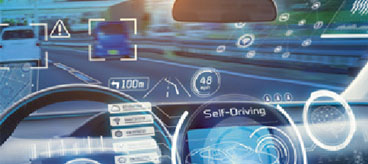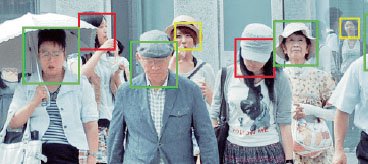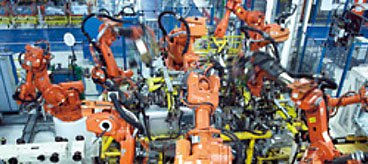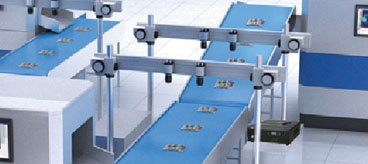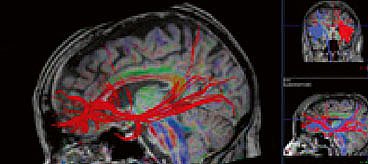Artificial Intelligence & Deep Learning
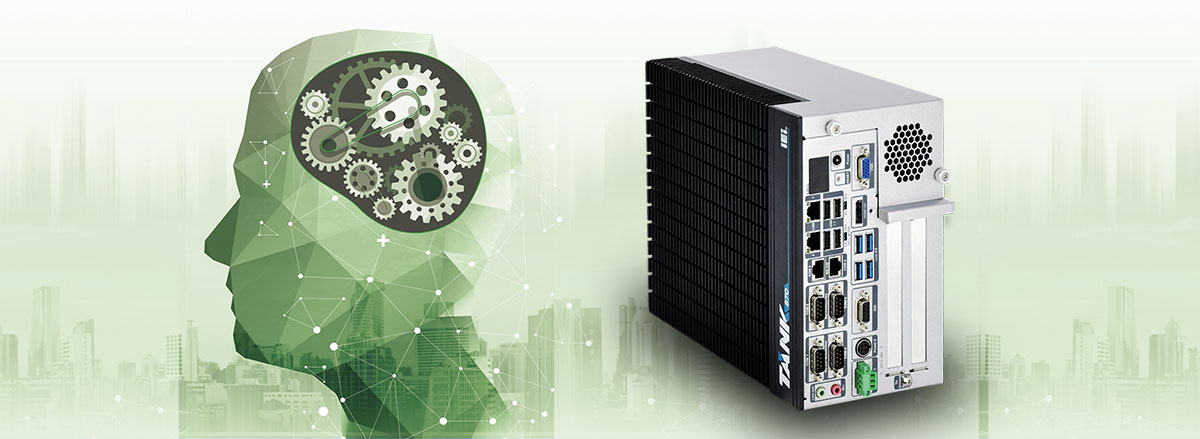
Since 2018/2019, ICP Germany has been offering a complete series of industrial PCs for the implementation of deep learning applications and projects in the field of artificial intelligence. The main focus of the industrial hardware under the IEI brand is an integrated intelligent Deep Learning Software from Intel. The Deep Learning technology is based on so-called neural networks, which enable machines to learn artificial knowledge through training and interference, to refine it and to recognize new information and process it sensibly.
Artificial intelligence and deep learning are part of the ongoing digitalization that Internet giants like Facebook, Google and Co are already using and will continue to be used in the future industry, where humans and machines interact.

 Your Advantages
Your Advantages
The advantages of AI solutions are versatile:
- ✔ Pre-installed software package consisting of openVINO™ Toolkit, Intel® Media SDK, Ubuntu 16.04 Desktop LTS operating system and Intel® System Studio 2018
- ✔ Intel® Core™ i5 /i7 processors and Intel® HD Graphics for analysis of high-resolution image and video data as well as machine and sensor data for optimally matched hardware performance
- ✔ Flexible scalable and expandable systems through PCIe x4 based acceleration cards equipped with VPU and FPGA technology
- ✔ Fast, simplified development and deployment of software at the Edge through practical reference examples
 How does artificial intelligence work?
How does artificial intelligence work?
Deep learning (DL) is a machine learning technique that is based on deep neural networks and recurrent neural networks architectures. These artificial neural networks are comparable with the structure of the human brain. The underlying learning procedure is realized by using representations of features directly from data such as images, text and sound. These representations are the result of abstracting input data in multiple layers and on different levels, which form a concise network. Deep Learning is applied for instance in fields of computer and machine vision, speech and audio recognition or social network filtering. In some cases the performance of deep learning algorithms can be even more accurate than human judgement.
There are three steps to sucessfully conduct deep learning projects:


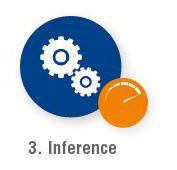

 Data acquisition & training
Data acquisition & training
Before the training of machine vision applications begins, data acquisition is required. A huge and varied set of data from any kind of source like web, cloud, sensors and images must be available. Then data aggregation and labeling takes place in order to be able to classify e.g. animal’s images accurately. Based on the aggregated data the Deep Learning model gets developed and trained. The training is being done by a learning procedure that consists of layers. The first input layer contains raw data e.g. a matrix of pixels which becomes automatically more abstract in the next layers (hidden). Step by step specific features (e.g. edges, eyes, nose) are encoded until the complete animal is recognized in the final output layer. The result is a dog can be distinguished from a cat.
GRAND-C422 AI Training System
The AI training system Grand-C422 is dedicated for these tasks because it offers a wide range of slots for storage expansion, acceleration cards and video capture, ThunderboltTM or PoE add-on cards for unlimited data acquisition possibilities. In order to develop a useful training model, existing and widely used deep learning training frameworks such as Caffe, Tensor-Flow or Apache MXNet are recommended. These facilitate the definition of the apt architecture and algorithms for a distinct AI application.
 Inference & optimization
Inference & optimization
Is the Deep Learning model ready for trial, it can be transferred to the inference system TANK-870AI for performance optimization and the execution of inference tasks. Inference is known as reasoning in steps, whereby existing knowledge is used to draw logic conclusions. In the field of AI, neural networks undertake this “prediction” and “scoring” by passing new data through a trained model to compute results for each query.
TANK-AI Inference System
One major advantage of the TANK-870AI is the preinstalled open-source developer toolkit Open Visual Inference Neural Network Optimization (OpenVINOTM). It is compatible with widely adopted Deep Learning frameworks, optimizes the Deep Learning model via an integrated model optimizer and inference engine (runtime) and accelerates the deployment process of the inference solution to the edge by pre-trained models, samples, and demos.
Included software
 Computing accelerators
Computing accelerators
In addition, the performance of optimized inference models can be further enhanced by adding heterogeneous low profile computing acceleration cards such as the Intel® field programming gate arrays (FPGA) or the Intel® Movidius® vision processing units (VPU). An alternative to the OpenVINOTM toolkit is TensorRT. The combination of GRAND-C422, TANK-870AI, the accelerator cards and a Deep Learning toolkit form IEI’s AI ready solution.
IEI AI Ready Solution
ICP offers three different acceleration cards. Whereby the Mustang-V100-MX8 is based on Intel® Movidius Myriad X and the Mustang-F100-A10 is based on Intel® Arria 10GX 1150 FPGA. Both are designated for inference enhancement. The CPU acceleration card Mustang-200 combined two Intel® Core ULT CPUs and offers additional inference performance.
Intel® Vision Accelerator Design Products
 Applications
Applications
 More news about AI
More news about AI
1. TANK-870AI – Industrial Inference System
Implementing AI in the production environment. Artificial intelligence (AI) is also gaining more and more importance in the industrial sector. A common application in the production environment is automatic optical inspection...
2. TANK-870AI – AIoT Developer Kit for inference at the edge
Deep Learning consists of the sub-areas training and inference. In the training phase, a training model is developed, tested and refined to the desired accuracy using a comprehensive dataset of images and videos...
3. Mustang-V100- Intel® Movidius™ Myriad™ X VPU accelerator card
The realization of deep learning inference (DL) at the edge requires a flexibly scalable solution that is power efficient and has low latency. At the edge mainly compact and passive cooled systems are used that make quick decisions without uploading data to the cloud...
4. Mustang-F100 – FPGA based AI-accelerator
The FPGA-based Mustang-F100 accelerator card from ICP Deutschland is designated for industrial inference systems. It is primarily used for deep learning inference in real time, for video and image processing as well as for the analysis of machine and sensor data...
5. GRAND-C422 – 19” PC System with Xeon® W Processor
Whether an AI training system or a high-performance system for image processing, rendering or mining, the requirements for performance, data storage capacity and transmission speed are almost exorbitant. The 19" PC...
6. Mustang-MPCIE-MX - Intel® MovidiusTM MyriadTM VPU accelerator
With the Mustang-MPCIE-MX2 card, ICP Deutschland expands its portfolio of KI accelerator cards with a Mini PCIe plug-in card variant. The Mini PCIe format enables system integrators to build small embedded PC systems with KI functionality for deep learning...
7. MUSTANG-V100 Series - Intel® MovidiusTM X VPU accellerator
With the Mustang-V100 series, ICP Deutschland offers a flexibly scalable solution for implementing Deep Learning Inference (DL) at the Edge, which is energy-saving and has a low latency time. The Edge primarily uses systems that are designed to make quick decisions without uploading to the cloud....
8. MUSTANG-M2BM-MX2 – Intel® MovidiusTM MyriadTM VPU accelerator
ICP Germany completes its portfolio of AI accelerator cards with the Mustang-M2BM-MX2 card. In addition to Mini PCIe and PCIe based solutions, an M.2 PCIe plug-in card variant is now available. With the M.2 format in the size 22x80 mm, system integrators are able to build small embedded PC systems with AI functionality as deep...
9. Ultra compact inference embedded PC with vision processing units
With the ultra compact ITG-100AI, ICP Germany offers an inference system that is prepared for use with dedicated neural network topologies (DNN). On the hardware side, the two Intel® Movidius™ Myriad™ X VPU in the ITG-100AI offer excellent inference performance per watt, 16 SHAVES cores for AI calculations...
Further information can be found in the following AI Info brochure (7,4MB) and our AI Flyer (2,4MB):

 Videos
Videos
Tank-870AI DEVELOPMENT KIT
Mustang-200: CPU accelerator
Mustang-200: CPU accelerator
Mustang-F100: FPGA accelerator
Mustang-F100: Installation guide
Medical AI Aplication
Mustang-V100: VPU accelerator
Mustang-V100: VPU accelerator


 Deutsch
Deutsch
 English
English
